This is my complete guide with a whole new and effective approach on how to deal with anxiety.
In this guide, I will NOT ask you to:
- meditate
- do yoga
- go for a walk
- visit the gym
- eat more veggies
- delete your FB account
- sniff jasmine essential oil
- touch crystals
These are all great things we can do to manage our anxiety—but only manage.
None of these things goes deep into the root of anxiety. It’s the same as taking a pain killer. It certainly makes you feel better, but it doesn’t treat the cause of the problem.
I’m not saying “stop meditation” or “eat junk food”. If you’ve found a way to deal with the anxiety symptoms, that’s a good start.
But, if you only eat broccoli and pumpkin seeds to calm your anxiety, and you’re still struggling, please keep reading!
I’ve been there.
There was a time I ran away from work like a kid who runs away from school.
There was a time I didn’t sleep for two weeks.
There was a time I almost had back surgery to alleviate the physical pain created by my anxiety.
A London’s Royal Ballet teacher—we’ll call her Olivia—called me the other day complaining about her severe back pain, “I can’t get off my bed in the morning”.
Olivia’s story matched my own story (which I’ll share with you later) and the story of my other coaching clients I’ve helped with anxiety—all high-performing, successful, hard-working, military-disciplined individuals with a bag of dreams.
Olivia convinced herself that years of training and dancing left her with permanent damage in her back.
She felt frustration, anger, and fear, “Why is this happening to me? I hate this pain! It’s ruined my life”.
Although I’m not a doctor, I suspected that Olivia’s back was fine.
The physical pain she experienced was a manifestation of anxiety, fear, worry, and emotional pain.
My work was to teach Olivia how to dance with her emotions—acknowledge, embrace and learn from her emotions.
When Olivia learned how to work with her emotions, the physical pain went away.
This guide is about dancing—dancing with anxiety.
Because all anxiety wants is to dance with you.
When you relax and enjoy this dance, anxiety stops becoming a problem.
In this guide:
- You’ll learn why all you’ve tried hasn’t worked or hasn’t been as effective.
- You’ll understand anxiety on a deeper level.
- You’ll discover how to transform your relationship with anxiety and see it from a more empowering perspective.
- You’ll find how to get relief from the physical pain you may be experiencing as part of your anxiety.
- You’ll feel confident to go back to living a normal life, dream again, and do the things you’ve always wanted to do.
But perhaps you find yourself questioning my promises and my new “meditation and yoga-free” approach.
You may be looking at the length of this guide and already getting anxious about how you’ll manage to read through all this information!
I hear you.
The longer you struggle with something and try to fix it, the more you’re looking for a sophisticated solution to your problem.
But trust me. You will see something new here.
I will show you that you’ve been looking for solutions to a problem that doesn’t exist.
Are you ready to dance? 😊
Table of Contents
The Anxiety of the Anxiety
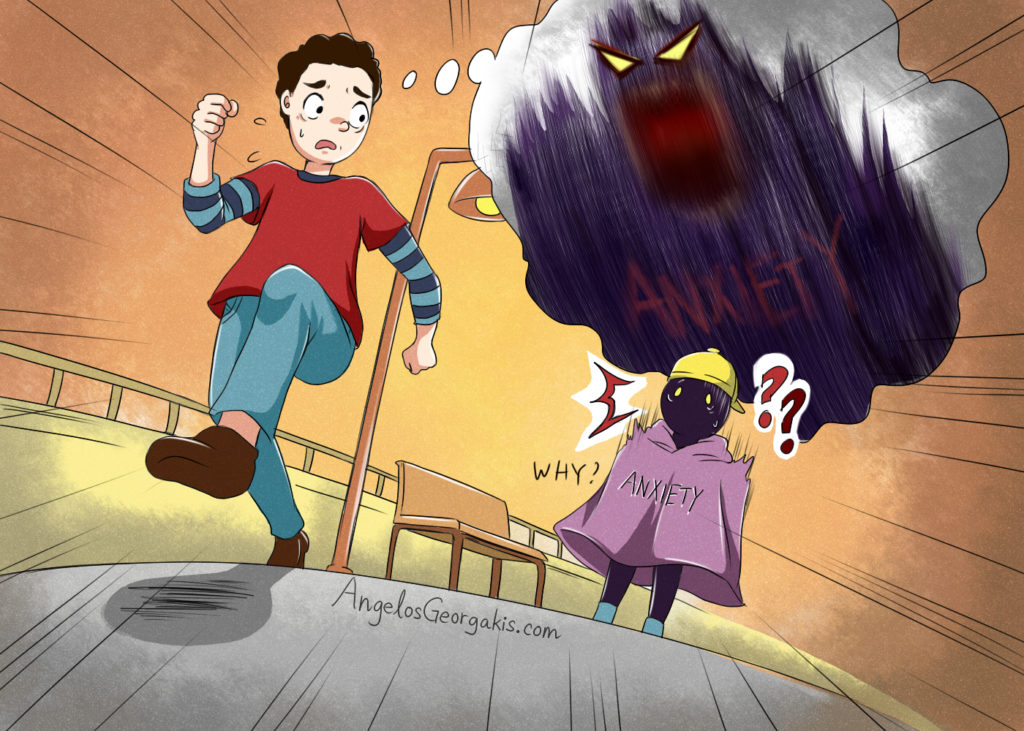
I have three questions that are going to help us get to the heart of the matter.
You can answer with a simple yes or no.
The important part is to notice how you feel when answering these questions.
- Do you want your anxiety to go away?
- Do you want to kill your anxiety forever?
- Do you want to say F*** off! to your anxiety?
Let me guess… yes x 3?
Or let’s better say YEEEES!!! x 3???
Can you feel that high energy inside you?
I know for myself I felt desperate to make my anxiety go away.
But when I thought about making my anxiety go away, I felt angry, furious, and hopeless.
Even when you say f*** off to your anxiety and you feel the giant within for a moment … the giant goes away sooner than the anxiety.
Have you experienced that?
I noticed a funny thing about wanting my anxiety to go away.
The more I wanted my anxiety to go away, the more anxious I felt.
Yes! I felt anxious about feeling anxious and feel even more anxious because of all that together!
Do you see the vicious circle here?
The real problem is NOT the anxiety.
The real problem is the anxiety of the anxiety!
Tip #1: Make Anxiety your Friend
How can one escape this vicious circle if most resources out there teach you how to OVERCOME, RUN AWAY FROM, FIGHT, BEAT, KILL your anxiety? 😡
I’m wondering…
If we’ve tried to kill it and it’s still there, what if we decided to ACCEPT, LET BE, WELCOME, BEFRIEND, LOVE our anxiety? 🤗

I know it may sound a crazy suggestion at first, but think about it:
If someone hasn’t experienced relief by trying to fight anxiety, why not try the opposite and see what happens?
What if we learned to love ourselves with the anxiety?
You may ask, “What do you mean love my anxiety, Angelos?”
Should you love your panic attacks?
Should you love yourself while you’re not even able to leave your home due to anxiety?
Should you love that your anxiety prevents your from meeting someone new?
I know, I know. It sounds crazy.
What I’m saying is … don’t fight it. Let it be there. It’s not going away anyway.
What if you accepted your anxiety and stopped worrying about worrying?
Those who ride a motorcycle know very well that they should be loose and relaxed enough to just move with the bike instead of holding too tight on the handlebars when they move over a pothole or bump. The tighter you hold on the handlebars, the more you “feel” the bump.
The same when you fall off the motorcycle. The stiffer you are, the more fractures you’ll get when hitting the ground.
What if your anxiety was a motorcycle and you learned to relax your hands when riding it?
What if we learned to be relaxed every time we fall?
It doesn’t sound easy at first, I know.
But doesn’t it make sense?
Tip #2: Pretend There is No Cure to your Anxiety
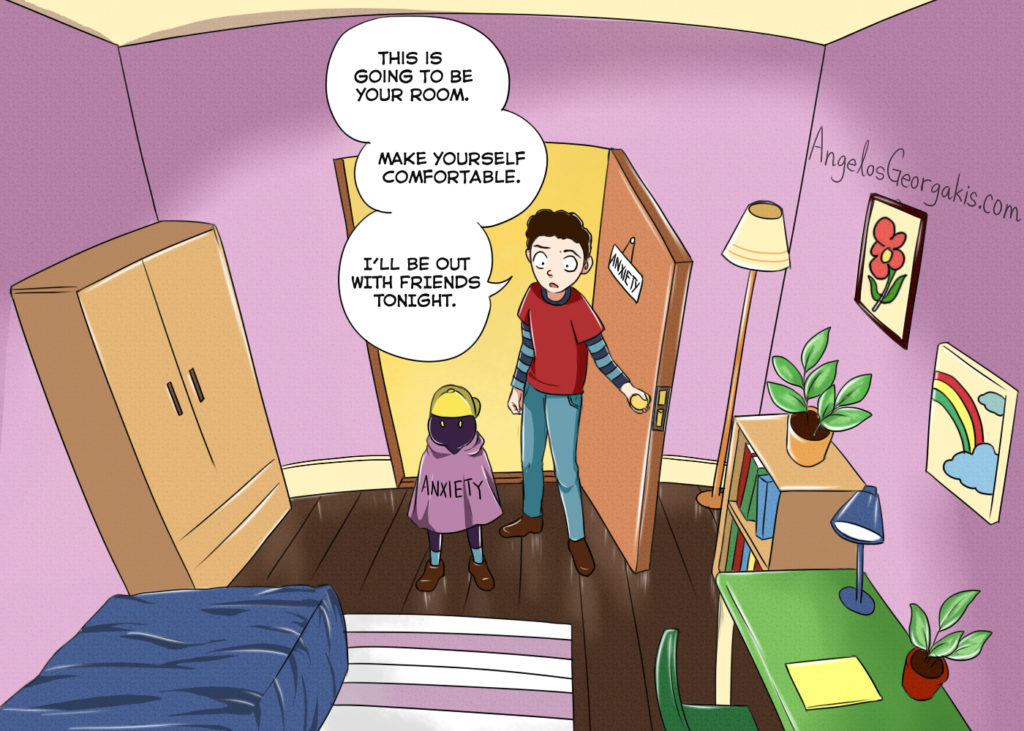
The first and easiest exercise I give to people is the one I call, “No Salvation.”
Imagine you and I are sitting face to face and I look into your eyes and tell you, “There is no healing your anxiety”.
How would you react?
WHHHHHAAAAAT???
You probably tried so many things that haven’t worked and I understand it’s hard to try one more thing.
But I know the power of this advice I’m giving you.
So, I’m asking you to try it even if you feel little hope.
Live your life for the next two weeks without worrying about your anxiety.
If your anxiety is incurable, how does it help to worry about it?
Pretend you’ve failed. Pretend there is no healing.
Go about your life and find something to do.
Read a book, meet up with your friends, learn to play the guitar.
If you feel like enjoying a pizza, go for it (and add some extra pepperoni for me). 🍕
Or if you’re inviting my friend Lisa, some fake vegan pepperoni!
Because if anxiety is incurable, you can now eat whatever you want—with whomever your want.
You can drop your yoga/zen/pilates/aquarobics/anger-robics for the next two weeks, too.
You can drop any activities you do to strive to manage your anxiety.
See what happens, or … actually, no.
Don’t expect anything from this exercise.
Can I guarantee this exercise will make you feel better?
No. I have no idea. Maybe yes; maybe not.
If I promised this to you, I’d already have set you up for failure—the failure that comes with expectation.
Let me say it again: Don’t do this exercise to feel better because as I said, there is no way to feeling better.
The only thing you can do is … live your life.
Because the secret is in living your life again.
I suggest you do this exercise for two weeks but you may want to stick with it for longer.
Imagine if you could access a device to wipe all the cookies that anxiety has left in your browser. How would you feel if you deleted the anxiety cookies? Just the anxiety cookies—nothing else!
What if you woke up one day without remembering having a panic attack in your life? Would you have another panic attack on that day?
Tip #3: Stop Asking, “Why Do I Feel the Way I Feel?”
Most of us struggle with anxiety because we keep asking WHY we’re struggling:
- Why do I feel anxious?
- Why is this happening to me?
- Why can’t I stop thinking?
- Why do I still feel that pain in my chest?
The obstacle to feeling better is asking why you’re not feeling better.
The habit of asking why I feel the way I feel shows an attempt to escape from whatever you feel, to run away from it, to get rid of it.
Yet, as the old saying goes: what you resist, persists.
Feelings are there to be felt—not understood.
The same applies to your anxious feelings.
Try for a week to allow everything you feel to be, to flow, to move.
You will feel better. Or maybe not. Still OK.
And if you end up feeling better, don’t try to hold tight to feeling better.
Allow those positive feelings to withdraw and welcome any negative feelings back again and so on.
By the way, the previous sentence is completely wrong.
There are no positive or negative feelings.
There are just feelings and those are to be felt.
Welcome ALL feelings and stop asking why you feel the way you feel.
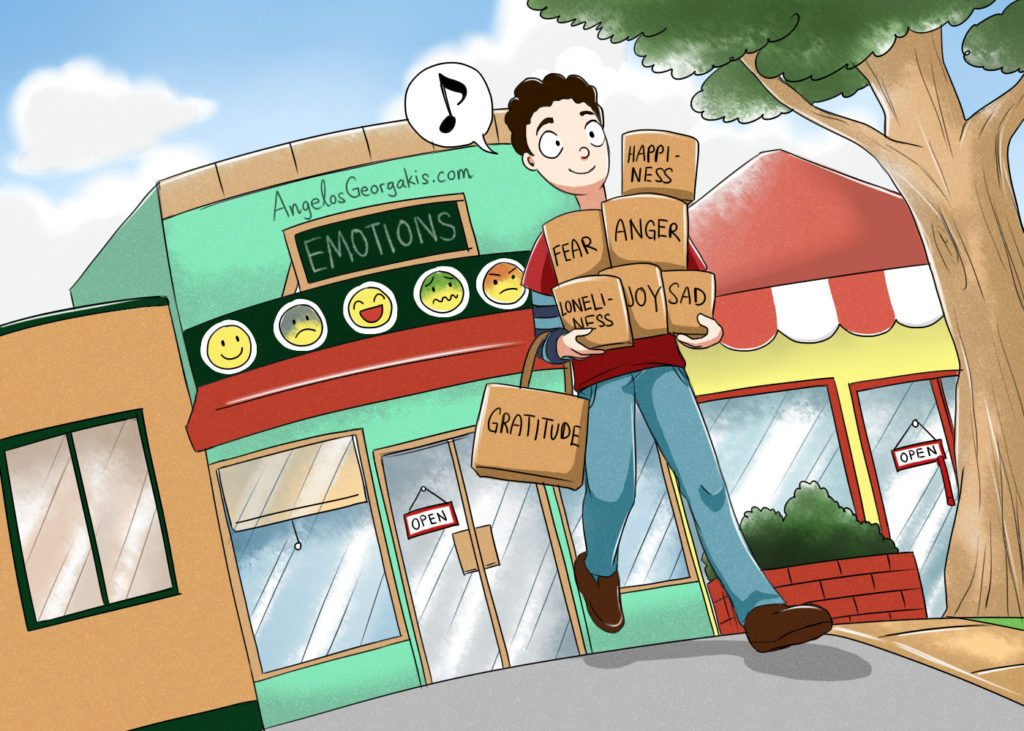
Tip #4: Stop Saying, “I Feel Anxious”—Say, “I Feel Excited”.
It’s not our fault that we see anxiety the way we do.
After all, therapists call it an “anxiety disorder”.
Does that working make you think there is no order in your brain?
There must be something wrong with me!
I got diagnosed with OCD. Let me check what OCD stands for? Oh! Obsessive-Compulsive Disorder?
Or they call it “social anxiety”. Oh… it means I’m socially awkward!
Emotions are different energy states that we experience in our body.
People perceive these energy states differently.
Some call it fear; others call it fun.
My wife is always trying to get me to see horror films. She loves them; I hate them.
She also love rollercoasters.
You couldn’t get me on a rollercoaster if you offered me $50,000.
$100,000? I’ll consider it! 🤣
Let’s say you’re nervous about a job interview. Instead of calling it interview anxiety, why don’t you call it interview thrill:
I’m thrilled to have this interview. I have a feeling this is a great career opportunity for me. I’m growing professionally. I’m experiencing this feeling because my body wants to keep me alert to rise to this interview challenge. I’m going to do my best and enjoy it.
Here’s another one:
❌ I’m nervous about my talk tomorrow.
✅ I’m thrilled to be speaking in front of all these people who’re interested in my work.
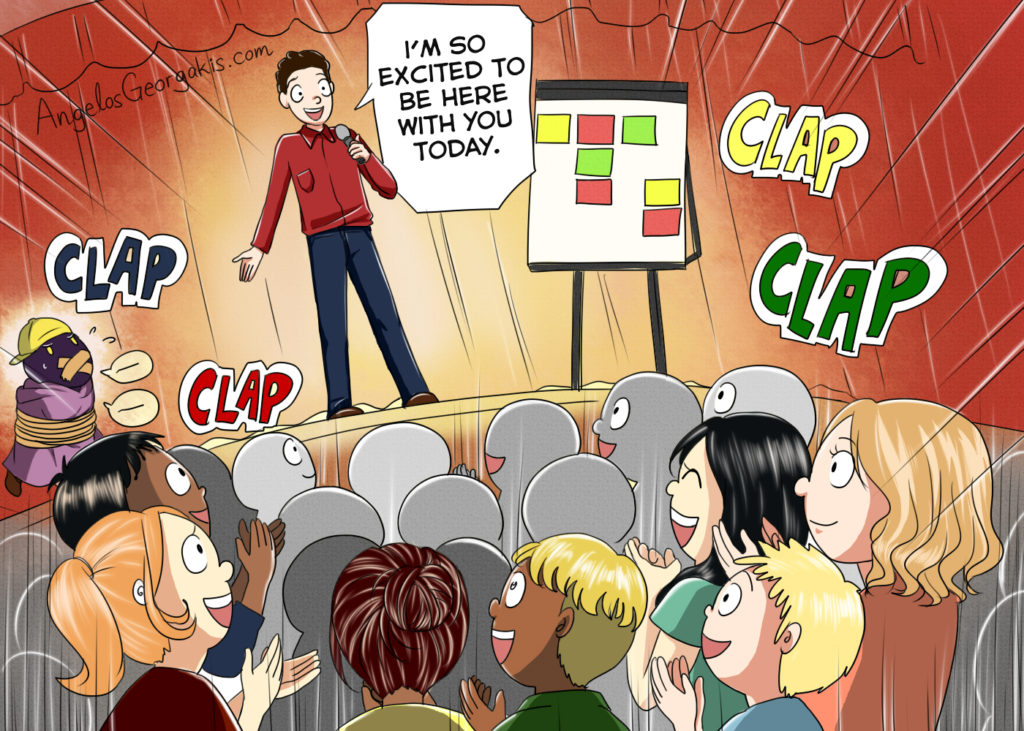
The words we use affect how we feel about something.
What if you stopped calling it anxiety and called it excitement—OMG it’s going to be f****** awesome—instead?
You are NOT feeling anxious.
You’re feeling:
- charged
- stirred
- juiced
- animated
- enthusiastic
- stoked
Practice this shift next time you feel anxious before your presentation, meeting, job interview, business trip, or your first day at work.
By the way, this technique is called anxiety reappraisal. 😉
Tip #5: Call your Anxiety Carla!
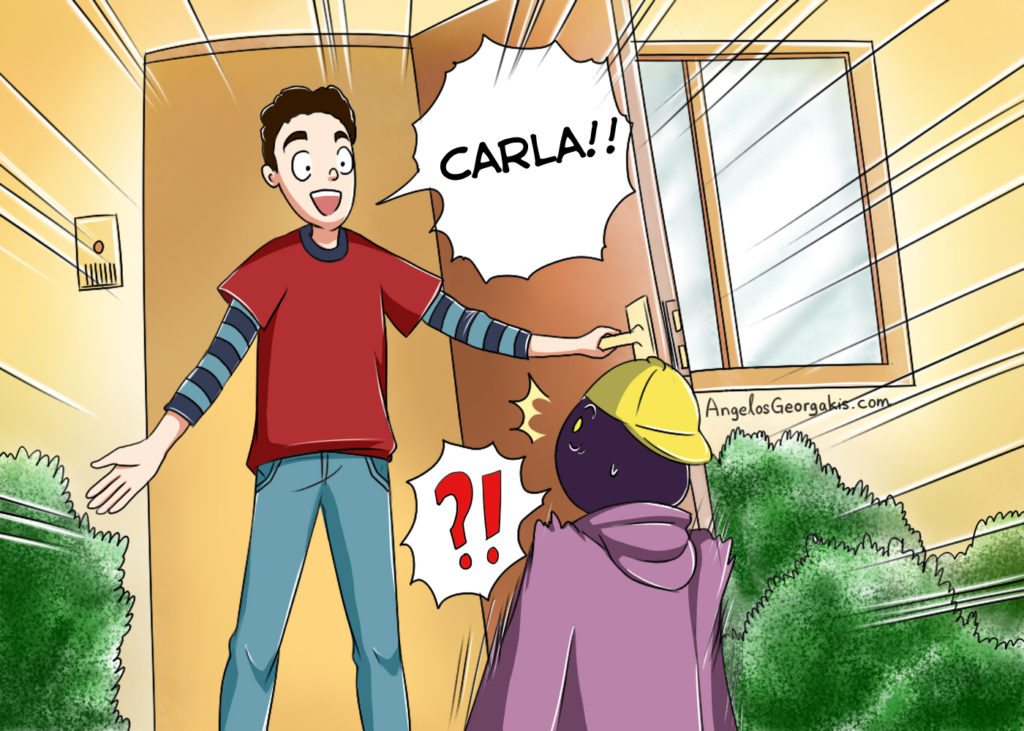
Here’s another tip that will help you observe your anxiety closely while staying detached to it.
Give your anxiety a name. Call it Carla or Peter or Hot Stuff!
Yes, you heard it right!
Talk with your anxiety as if it’s someone else.
I call my anxiety little Angelos, by the way.
Every time your anxiety thoughts kick in, talk to Carla, “Oh, here’s Carla again. I missed you, Carla. Come on; sit down with me. It’s OK. You can sit here for as long as you want. I know you’re here to make sure I’m safe. But I’m doing alright”.
Or you can refer to Carla in the third person, “All these thoughts are not mine. They’re Carla’s thoughts. She often visits me to make sure everything is all right with me. But everything is fine.”
And then you can go back to your work: “All right then. I just need to go back to my book now, but feel free to hang out, Hot Stuff!” 🌶
By the way, this technique is called cognitive diffusion but don’t worry for now. Just call your anxiety Carla!
Tip #6: Try to Remember a Positive Feeling
We should fully accept and embrace everything and anything we feel.
However, if you find yourself stuck in what you label a negative feeling, here’s an exercise for you to practice:
Write down in a journal all the feelings you wish to experience that you currently don’t feel. For example:
- I want to feel relaxed.
- I want to feel happy.
- I want to feel loved.
Let’s say you feel anxious and you want to feel relaxed again. Bring to your memory a time when you felt relaxed. See if you can remember that feeling.
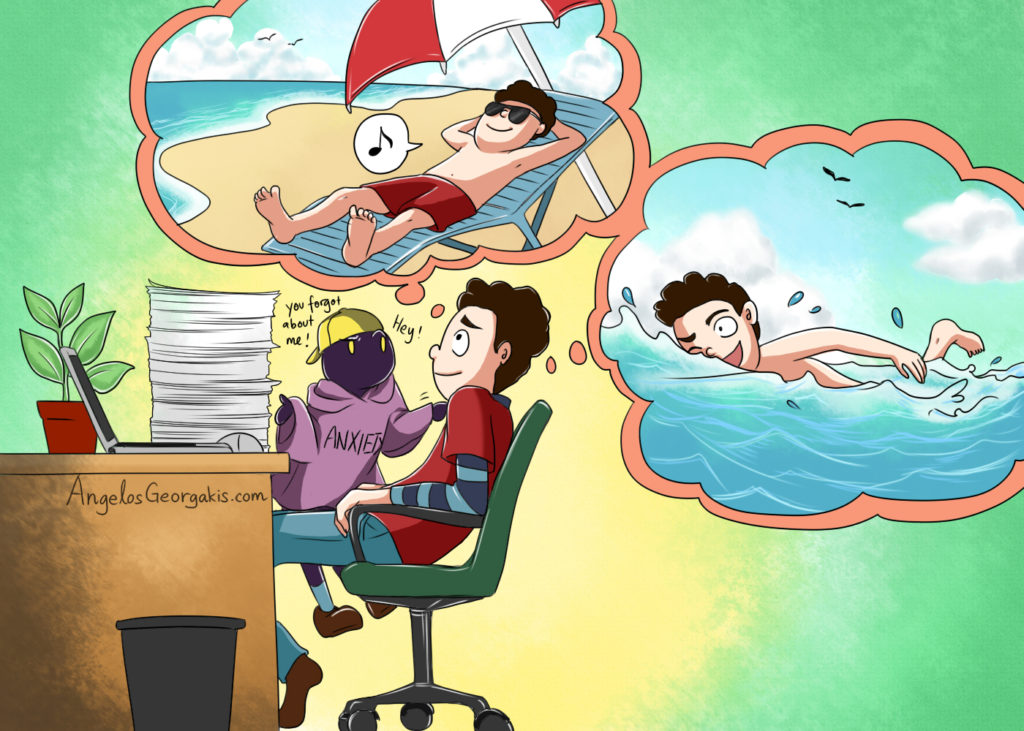
The purpose of this exercise is not to run away from the negative feeling but just give a nudge to a positive feeling.
This practice makes it easier for the desired feeling to manifest again.
Note: This exercise works a lot more effectively than the usual positive affirmations. Because it’s hard to believe you’re calm when in reality you feel super anxious. If you repeat to yourself, “You’re safe, you’re calm, you’re relaxed” but all you feel is the exact opposite, you create more friction and anxiety. Acknowledge the way you feel and see if you can remember a time when you felt calm.
Tip #7: Start Saying, “I Don’t Know”.
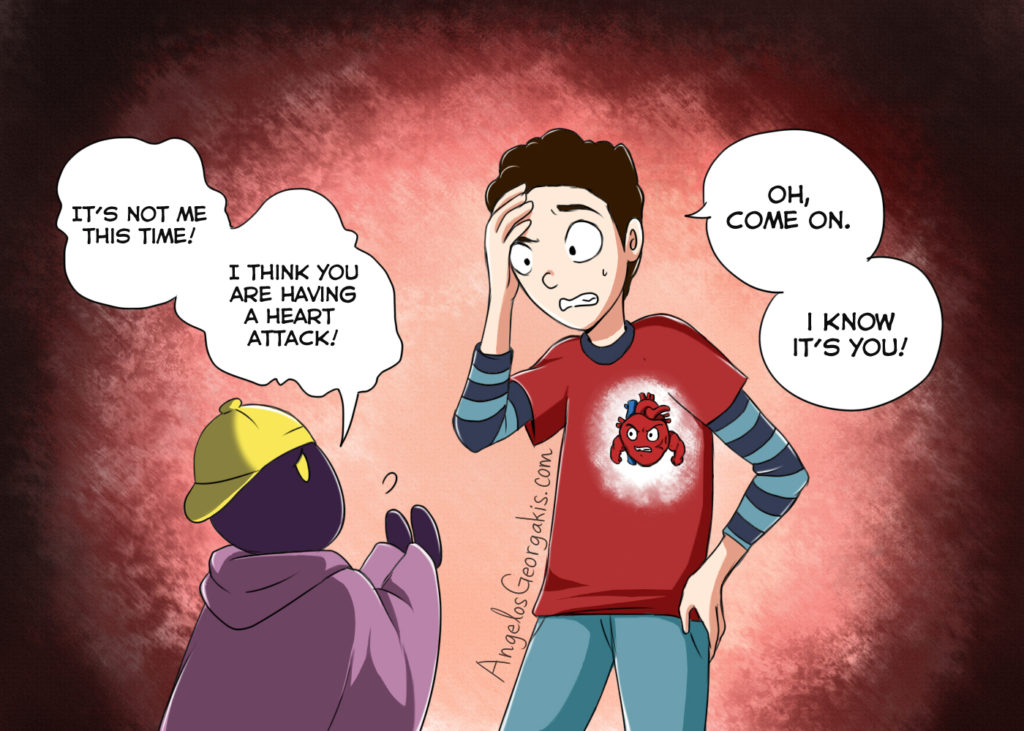
For years I came up with all sorts of stories about my anxiety.
I attributed my back pain to:
- a motorcycle accident
- sciatica
- my L4-L5 disc bulge
- lifting those heavy bags last Sunday… you get the picture.
I even convinced myself that the pain in my chest was a heart condition.
My beloved uncle died at age 42 from a heart attack and I felt certain I’d succumb one day like him.
I didn’t even realise at first that my issue was anxiety.
You obviously realise your issue is anxiety but you still may be coming up with stories about its cause:
- I think it’s a family thing and genetics.
- My mom also has it.
- If I start to meditate regularly it will go away one day.
- Every time I have pizza after 11 pm, I experience anxiety the next day.
Isn’t it amazing that anxiety makes us certain about things that we can’t prove?
And these things often happen to be the worst-case scenario?
Isn’t that enough to start being sceptical about these facts?
For example, my uncle smoked heavily whereas I never smoked a cigarette in my life.
My blood test markers have always been great.
I can swim for hours in cold water.
What “heart condition” are you talking about, Angelos?
Do you have proof about all this you believe with so much certainty?
Ummm… no! So, why don’t you choose to believe something different?
How?
Start saying, “I don’t know”.
Am I having a heart attack? 👉🏻 I don’t know. Maybe not; it’s not the first time I’m experiencing this.
Am I losing it? 👉🏻 I don’t know. If I’m asking this question, I’m probably sane.
Why am I feeling like that? Is it because of my high carb diet? 👉🏻 I don’t know. Not everyone who’s relaxed goes keto or paleo.
Start questioning all your beliefs around your anxiety.
Doubt is the first step to believing something more empowering that will serve you better.
Our brain focuses on negative things because it’s hardwired to watch out for threats. This has had an evolutionary benefit; we manage to survive. On the flip side, it often undermines us. Watch the last minute of the video below in which I interview Efrat Ginot PhD, an award-winning psychoanalyst explaining this.
Tip #8: Respond to Anxiety With D.A.R.E
One of my favourite books on anxiety is Dare by Barry McDonagh.
Barry adopts a similar letting-go approach to anxiety:
Anxiety is a nervous energy in your body that rises and falls like the waves in the ocean. When you resist the wave, it tosses you around and scares you. When you move with it, you ride up and over it and eventually lose the fear of the waves. The waves become a problem only when you respond to them in the wrong way.
Barry’s DARE technique involves 4 steps: Defuse, Allow, Run Toward, Engage.
Defuse
When anxiety kicks in, the mind starts asking questions of the type:
What if I lose control and start shouting? What if I faint? What if everybody thinks I’m crazy? What if my thoughts never stop? All those what-ifs represent the fear of the fear rather than the anxiety itself.
The defuse step is to answer a bold, “So what?” to all those racing “what if’s”.
❓ What if I start shouting?
👍 So what? If I start shouting, people may look at me for a second and they’ll go back to their business.
❓ What if I faint?
👍 So what? If I faint, someone will see me and lift me up or I’ll stand up on my own after a few minutes.
The secret here is not to provide the most thoughtful and knowledgable answer or believe your answer 100%. All you need is to respond to those what-ifs with a strong so-what attitude. That’s the dare response!
If you can’t come up with a cool counter-response… just respond with a generic, “Whatever! This is all energy and will move away!”.
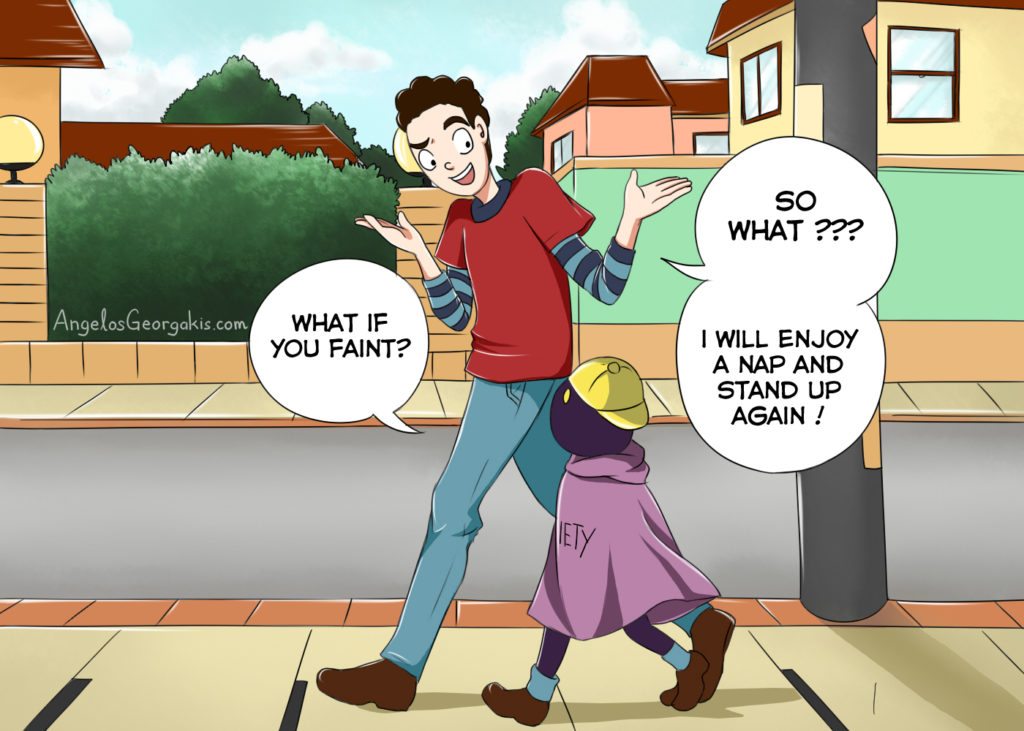
Allow
The next step is to allow this energy to flow and manifest in any way. Accept it. Don’t fight it. Don’t try to run away from it. Repeat a mantra that helps you express full acceptance of the anxiety:
I accept and allow this anxious feeling. I accept and allow this anxious feeling.
You must learn to get comfortable in your anxious discomfort. Healing anxiety is counterintuitive. You have to move with it to really be free of it.
Run Toward
The first two steps (Defuse and Allow) are the most important, but if anxiety persists, reframe it by saying, “I’m excited by this feeling!”, as I suggested earlier.
Barry mentions a famous clinical psychology study from the 1960s to illustrate the flip from anxiety to excitement:
In that study, researchers told participants they were being injected with a new drug to test their eyesight. The participants were actually injected with adrenaline (which causes an increase in blood pressure and heart rate). One group were put in a room with an actor who pretended to get excited by the drug. Another group were put in a room with an actor who responded with frustration and anxiety. As you might guess, the result was that each group responded in the same way as the actor in their group. Even though they all experienced the same nervous arousal, the actor directly influenced their perception of what was happening.
Engage
The last step is to engage with something that takes your full attention such as reading a book, watching a YouTube video about something interesting, or having a phone conversation with a friend.
Do not stay idle. If you’re idle you’ll ruminate and check-in all the time. After you’ve followed all the three previous steps, your anxious mind will tend to check-in to see if you’re already feeling better. By engaging with something that takes your full attention, you reduce the check-in times.
Tip #9: If you Feel Anxious, Do Nothing!
People often ask me, “What should I do when I feel a severe anxiety symptom?”
I used to ask my own coach the same question. In my case, my anxiety had immediate symptoms such as chest pain, back pain, shortness of breath, and lagged symptoms such as inflammation, skin problems, dandruff, etc.
If it’s OK to experience anxiety, wouldn’t it make sense to just do nothing?
Yes, the answer is do nothing.
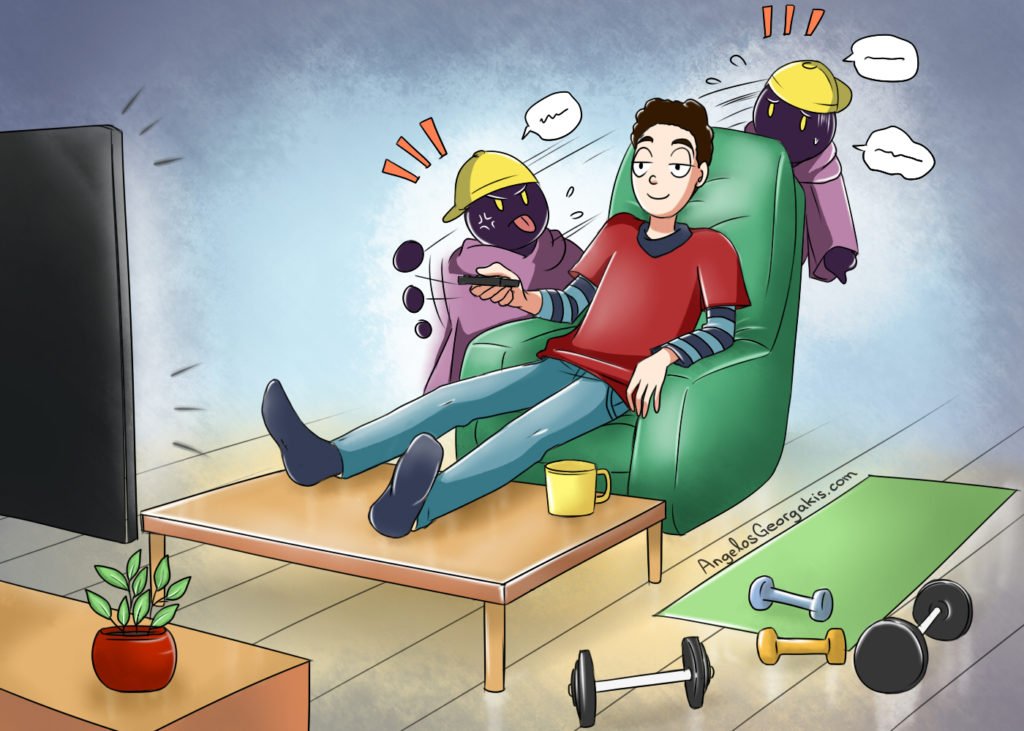
Others will say take deep breaths, do meditation, stretching, drink lots of water, sit down with your hands on your knees, etc.
I don’t know about you but I often used to feel worse when doing those deep breaths.
Have you ever experienced that? To me, it’s like you’re being chased by a tiger, so you climb up a tree and also decide to do a few pull-ups just to get fit!
Or you sit down to meditate and you’re driving yourself nuts because it’s just impossible to stay quiet when you’re feeling anxious.
It’s like asking someone who’s having a panic attack to, “think positive.” Oh really???
The problem with all these techniques—and anxiety management, in general—is that every time you “have to do something about it”, you send a subliminal signal to your mind that there is a problem at hand and you have to do something about the problem.
The second problem is that people get so heavily invested in a magic trick which creates more expectation; if the trick doesn’t give them relief, they get even more anxious.
What should you do then?
Experience whatever you feel. Turn the focus to your body. Experience the tension, the shortness of breath, the pain in your back, the racing thoughts. Develop curiosity and wonder.
Say to yourself, “I don’t have any idea what this is, where it’s coming from and why I’m feeling it, but I’m willing to explore it.
I find it uncomfortable and one part of me doesn’t want it. That’s OK. I’m still willing to feel whatever I feel, observe it and see where it takes me”.
I’ve realised that it’s not yoga or breathing or any anxiety management trick that removes the anxiety. The anxiety will go away when it thinks you’re safe. These different anxiety management methods just keep you busy while you’re experiencing the feeling of anxiety.
To be fair, if you’ve found a way to keep yourself distracted while you’re feeling anxious, that’s OK.
But the more you get familiar with the feeling, you’ll understand that you don’t have to do anything.
It’s just the feeling of anxiety. It will take you a few seconds and a couple of thoughts to switch it off and move on with your life.
Anxiety and Physical Pain
My Personal Story
At 26 years old I got hit by severe back pain that lasted 8 months.
The back pain was a result of extreme stress and anxiety. Well, I realised that only a lot later…
I lived in London back then and I worked in investment banking. I earned a lot of money but I felt unhappy with my job. I wanted to quit.
My family back in Greece, my friends, my girlfriend couldn’t understand.
There are no jobs around. You’re earning a ton of money and you want to quit your job? Are you crazy?
I turned into myself, experiencing anger for many poor decisions made in the past. What if I had done this or that… things would be different now…
Even though I worked long hours, I’d get up at 4am to prepare myself for my next steps—learning, planning and doing the side business.
After two months of my heroic 4am mornings I experienced severe back pain.
Getting out of bed in the morning became a nightmare. I would punch the wall, shout in pain, curse myself and everyone else. Why is this happening to me?
I watched the elderly people walk past me on the sidewalk—me, a 26-year-old, 6’ 5” man. Catching the bus in the morning became my #1 life goal.
I’d come up with all sorts of random reasons for the cause of the pain: It’s my Oxford shoes. The chair at work. The lack of exercise.
My colleagues stopped saying, “Good morning” and replaced the greeting with, “Hey, how’s your back?”.
One day the guys from the employee health and wellness department brought to my desk the most anatomically correct, ergonomic and expensive chair in the world.
They sent consultants to teach me how to sit. I’m laughing now but I was serious about my back, back then! I took serious notes on how to sit properly.
I then turned my focus to physical exercise, desperate for relief. Although I often found temporary results, the pain remained there and I’d occasionally experience anxiety and a panic attack. I’d swim during lunch break with my colleague Roberto.
I won’t forget the panic attack I had in the shower one day. My heart pounded like crazy. My head felt ready to explode. I could feel my high blood pressure. Was this a heart attack?
I still remember sitting down on my knees for 10 minutes in the shower, water falling on my head.
Roberto had already dressed and waited for me outside, “Man, what’s wrong with you? We’re late! I thought you’d stay in the shower forever!”.
One day I just couldn’t sit still in my chair. I had gone for a couple of walks on the floor. It didn’t work. I stayed for 20 minutes in the restroom. It didn’t work.
I had to leave the building and go outside. I still remember everyone looking at me surprised while I left my desk and walked towards the lifts.
As I left the building my heart still pounded, I felt pain in my chest and shortness of breath. A heart attack?
I called 999. 40 minutes passed and I became even more anxious waiting desperately for the ambulance in Cabot Square, Canary Wharf, London.
Here’s the funny thing. The more I waited, the more I cursed NHS and the ambulance that wasn’t coming. I called again, explained my situation, shouted at the lady on the phone, and believe it or not, I started feeling better!
I’d later realise that the phone call with the emergency worker helped me turn my focus away from myself to the outside world. I had to use cognition to explain how I felt, I answered a few questions. I gave her directions as to where I was and the fact that the lady’s attitude remained neutral calmed me down.
Sounds familiar? That’s why performing cognitive challenges that require your brain to think distracts you from your anxious thoughts.
In the end, since the ambulance was taking too long to arrive, I went to University College Hospital on my own. They didn’t find anything wrong with my heart. I asked the doctor, “Are you sure I didn’t have a heart attack?”. “Your cardiogram looks pristine”, the doctor laughed.
I then took yoga classes too. Although I occasionally felt better, my back pain persisted. My instructor said to me one day, “It may be sciatica. You need to visit a specialist”. I visited more than one. I had X-rays, MRI’s and everything else.
Yet, the doctors couldn’t find the exact reason for my back pain. One doctor blamed a slipped disc; the other quipped, “If you see my MRI, it looks 10 times worse than yours and I don’t have any pain”.
Pain became part of my life. My final option was surgery. I visited a surgeon who said I could probably find a way to get relief using other methods like exercise or yoga but his job would be to give me immediate relief so I could start living my life again.
Bullsh*t!
Instinct told me not to have back surgery. Good thing, because as I found later, the problem was not my back. It was repressed emotions, anxiety, and Tension Myositis Syndrome. I learned that when I read Dr Sarno’s book Healing Back Pain and went through all the scientific studies about the real causes of back pain.
I recommend Dr Sarno’s book not only to those who experience physical symptoms but everyone with anxiety.
Let’s now go deeper into anxiety and physical pain.
Why Do I Experience Physical Pain?
I mentioned earlier that anxiety is your friend. Anxiety is indeed a very good friend who’s trying to protect you from an imaginary threat.
The anxiety is there to protect you from feeling uncomfortable (“threatened”) if you decide to go to your friend’s wedding, leave your house, or go to that networking event.
In my case, the anxiety took the form of physical pain and helped me shift my attention from my inner battles to something else—back pain.
All of a sudden, it became easier for me to have to deal with back pain than deal with all the other big life decisions: “Shall I quit my job? What if I disappoint my parents? What if I end up with no savings? What if the business doesn’t work?”
Physical pain serves an important purpose: “Let’s give this guy something easier to worry about because he will drive himself crazy with his big life decisions!”.
It’s what they call in clinical psychology “a designated issue”.
A designated issue performs a service for an individual, dominating the psyche so that other troubles can go unnoticed.
The pain came to my life to save me from my anger, frustration and all the other negative emotions. It put an end to my worries about building a new career, the side business, or my parents.
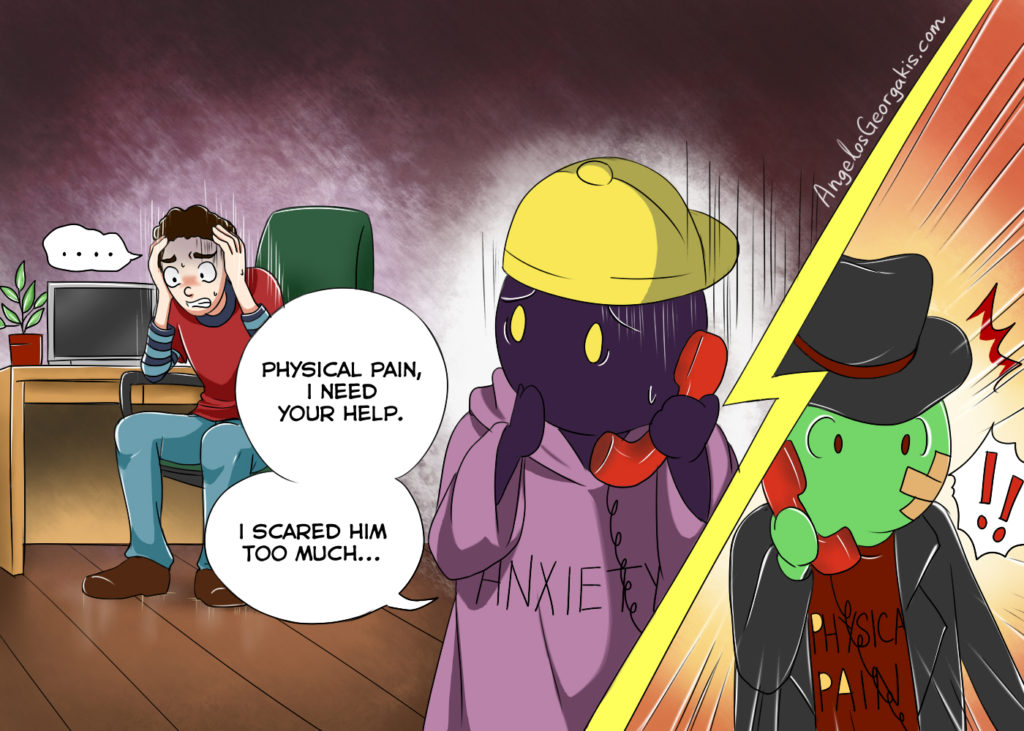
Guess what?
Not only did I stop fighting with my parents but our relationship became better. Instead of fighting with me about a potential career change, my parents expressed concern about my back pain.
Here it was—a pain we could agree upon!
While not everyone agrees with Dr Sarno’s views (see Julia’s article below), his book gave me all the answers I needed.
In a nutshell, here’s Dr Sarno’s philosophy as described in this article by Julia Belluz:
Dr Sarno believed that the brain distracts us from experiencing negative emotions by creating pain. We may not want to accept the uncomfortable truths such as feeling angry with our children, or hating our job, so instead of thinking those thoughts, we focus on the pain. He also thought that pain was created by reduced oxygen and blood flow to the muscles and nerves of the body. So our brains unconsciously direct blood away from certain areas of our body, and that creates pain.
Every time I recommend this book to my clients I get responses like the one below:

Here’s another interesting story from Edward Siedle, a Wall Street trader who found relief by following Dr Sarno’s teaching. I see a similar pattern all the time. Many successful and ambitious people suffer from lower back pain tied to anxieties. Because they want to do more, they push themselves to their limits, setting a high standard of ethics and professionalism. Are you one of them?
Here’s another observation from my own experience with back pain: The pain would be more intense during weekends or holidays. This makes sense … because think about it.
When you have to deal with work and stress, your focus goes away from your back and you enter an alert mode. When you have to go through 150 emails, you enter a survival mode as if you’re trying to escape a tiger. It makes no sense to focus on your back pain the moment the tiger is chasing you. You can’t afford to negotiate with the tiger, “Hey, I can’t run fast right now because my back hurts. You can come back tomorrow to play fair”. But when you’re back in your cave, your body will give you as much pain as needed so you don’t leave the cave the following morning and get eaten by the tiger!
This is an explanation from a physiological point of view from David Hawkins book Letting Go:
Some executives develop swollen ankles as the week goes on, and then on Friday evening they have frequency of urination. They complain of a letdown due to the sudden decrease in the level of the cortisol hormone. In addition to a somewhat euphoric effect, cortisol also has an anaesthetic effect; therefore, during the letdown period of low-cortisol production, weekenders may notice physical symptoms that were ignored during the excitement of the work week, and they may complain of many aches and pains over the weekend that weren’t experienced while at work.
Health Anxiety
You Have No Health Condition (A Proof by Contradiction)
As a mathematician, I’d like to give you a more mathematical proof here to prove the point that all your worries about having a health condition are only worries.
Think about it.
When you feel anxious and your heart pounds, you’ve had a few missed heartbeats, a tight throat or chest, you conclude that you have a heart condition, right?
OK. Let’s assume this is true.
Later in the evening, when you’re no longer feeling anxious, you do a 15-mile run or weight lifting in the gym. And then you go on a weekend trip, days go by and all of sudden you forget you had a heart condition! How is all that possible? Did your heart pound when you counted those miles on the treadmill?
It’s the same as if your car’s engine appears broken only when you drive to work but the engine seems to work fine when travelling endless miles in the country on the weekend.
Isn’t that a contradiction?
Why do you remember that you have a heart condition only when anxiety kicks in?
If you think your spine is damaged, how come it doesn’t hurt 24/7?
Why do you experience the pain only in the morning or on the weekend? If something is damaged, it should give you pain 24/7, no?
Here’s the truth, when it comes to bodily sensations, as explained by Barry McDonagh in his book Dare:
“We don’t get anxious about a pounding heart after we’ve been running because we know the exercise was the cause of the sensation. Nor do we get anxious after we’ve stubbed a toe. The problem comes when we can’t identify a cause for the sensation. Our brains are designed to keep a vigilant lookout for threats in order to keep us safe. If we feel a strange sensation and we don’t know why it’s manifesting, we tend to jump to fearful conclusions”.
It Might Take a Few Visits to the Hospital
You’re not alone if you perceive the symptoms of your anxiety as an indication of a serious health condition. We’ve also seen that anxiety can manifest as physical pain in our bodies—back pain, chest pain, or tension in the muscles.
When we start experiencing the pain, we come up with all sorts of reasons as to what’s causing it, “Oh it’s definitely a pinched nerve, I should stop playing basketball, I should take vitamins and mineral supplements, it’s my diet, it’s my sleep, it’s the stress at work”.
When the pain becomes so intense and Google is not enough to ease our fears, we end up in the emergency room!
I encourage you to visit the hospital as many times as you wish and do all the blood tests and medical examinations you and the doctors think are necessary. The more, the better.
You may find there’s nothing wrong with your heart, back, stomach, thyroid, or anything else.
One day you’ll finally say, “Oh… welcome back anxiety! Sorry, we’re not visiting the hospital tonight. We’re staying at home”.
If on any of your visits, you ever get diagnosed with anxiety, then congratulations. That’s the best thing that can happen to you. 275 million people in the world experience anxiety like you do.
According to the National Institute of Mental Health, in any given year, 19% of U.S. adults suffer from an anxiety disorder, and 31% will deal with a disorder at least once in their lifetime.
To be honest, I don’t believe those numbers. I think we are many many more. Join the club. It’s just anxiety.
The Problem with Anxiety Management
The missing piece of the Anxiety Puzzle
Every time someone says do yoga, exercise, meditate, take time off from work, travel, listen to Mozart, etc. they’re talking about anxiety management. They see anxiety as a monster to be afraid of. 👹
The anxiety management approach is all about putting the monster to sleep as much as possible. Every time the monster wakes up, we rush to a yoga studio. Most of the resources and articles you’ve read only touch the surface layer—anxiety management.
Those who understand that anxiety management is not effective and doesn’t last long, decide to be more tactical with anxiety and believe they can eliminate it from their lives. They play it cool to heal or cure anxiety.
They use the “love your anxiety” rationale as a self-deception tool. But there is still expectation on this second level. If you want to deceive or kill the monster, that shows you’re still afraid of it. The monster will soon discover your plot!
The missing piece that takes you to the root of anxiety is dropping any expectation when it comes to anxiety.
You’re truly OK with living with the monster and you become familiar with the presence of the monster in your life. You can watch a film with the monster! And you no longer see a monster! You know it may scare you to death every once in a while but it will never throw you off track any more. And if it will, it’s still OK! You know how it feels. You know you’ll get back on track. That’s the missing piece of the puzzle, the letting go of the expectation, the real freedom.
What if there is no Rain to Smell?
I once read a tip that I found fascinating and beautiful: The smell of the rain can reduce your stress!
I can recommend this to clients, friends and myself but what if someone lives in Arica, Chile, one of the driest places in the world?! Is that person condemned to feel anxious forever?
What if you’re finding it hard to fall asleep but you’ve run out of lavender essential oil?
What if today is Sunday and you can’t swim off your anxiety because the swimming pool is closed?
If the only way to reduce your anxiety is the rain, the essential oil, the swimming pool, then not having access to these can flare up your anxiety even more, right?
That’s the fear of not being able to do something about the fear, ie. the fear of the fear.
The good news is that you don’t have to do anything other than experiencing the feeling.
You don’t need the rain, the lavender oil, the swimming pool. It’s just the usual feeling of anxiety and it will go away.
Meditation? Sorry, I Don’t Need it Anymore!
Meditation is a cool thing. I meditate.
Meditaton works best when is used as a practice to cultivate a way of being. When you use it to try to change your state, you’re already putting a non-meditative intention onto it.
Once you’ve learned to make peace with all the emotions you feel, you no longer need to meditate in order to get relief.
You can go to a social event without having to do some deep breathing for 10 minutes in the car.
You can work for 12 hours on your laptop without having to do any stretches or take frequent breaks.
Your mind will try to sabotage you, “Hey, are you sure you can go on working for so long? Do you think it would be that easy? Maybe I shouldn’t drop my meditation routine”.
You will have all sorts of thoughts like these and you will give in to your anxiety. However, the more familiar you get with this pattern or habit, the more you’ll be able to spot it and not react.
When it comes to physical symptoms and back pain, Dr Sarno would encourage his patients to keep exercising. That’s a positive signal to your mind, “Hey, if I’m able to run and go to the gym, maybe there’s nothing wrong with me”.
The same applies to anxiety. This strategy tricks your mind like this:
“If I don’t have to meditate or follow all these anxiety management techniques, maybe it means I’m anxiety-free?”
Moving Gracefully Along the Anxiety Line
You can visualise all your possible emotional states as being points on a line segment.
On the far left point, you have a Zen state in which you feel totally happy, calm, and grounded. That’s probably the desired state for most people.
On the far right, you’ve got the state of the maximum anxiety you’ve ever experienced.
True freedom is not about developing a skill that controls your emotions and locks you on the left part of the line.
The real relief comes from being OK with experiencing any feeling that lies anywhere on that line.
The real relief comes from accepting that you’ll navigate back and forth on that line throughout your life.
People believe that they will reach a point when they’ll be able to build a wall in the middle of the line and never experience their anxiety any more.
A desire to build that wall is the anxiety itself.
Looking at it from another perspective, I find it schizophrenic to want to limit ourselves to the one end of the line.
Life isn’t like that anyway. The whole life is transitory.
There is good weather and bad weather. There is day and night.
Why should we only feel serenity, calmness, inner peace?
I can’t imagine how any form of art would look like if we were always confined to the left part of the line.
I can’t imagine how relationships would be.
I can’t imagine how human achievement (personal or collective) would be.
Can you imagine a swimmer breaking the world record in the Olympics and feeling calm?
And tell me seriously. Wouldn’t it be boring to live your whole life in a zen state, no excitement, no anger, no disappointment, or anything other than total happiness? I wouldn’t be able to live like that.
And if you’re experiencing anxiety right now, you may think, “Yes! That’s exactly what I need right now”, but if you ever got locked in a Zen state forever, I bet you’d miss your anxiety.
The more we strive to keep ourselves as close to the left, the more we sabotage our efforts and end up on the right on the anxiety line.
The more open you are to swinging back and forth anywhere on that line, the more chance you have to stay on the left.
Things such as yoga, gym, and meditation help you to stay grounded and feel better (move towards the left) but their effect is transitory.
What happens when you come off that Zen state?
What happens when the outside world goes upside down?
What happens when you lose your job, go bankrupt, lose a family member?
It’s funny but sometimes you will even experience anxiety caused by an event that initially sounds exciting or something you’ve always wanted to achieve (fatherhood or motherhood, moving to a new country, getting promoted to director).
Not sure about you but this is how I see it:
Let’s jump on our skateboard and enjoy riding anywhere on that line.
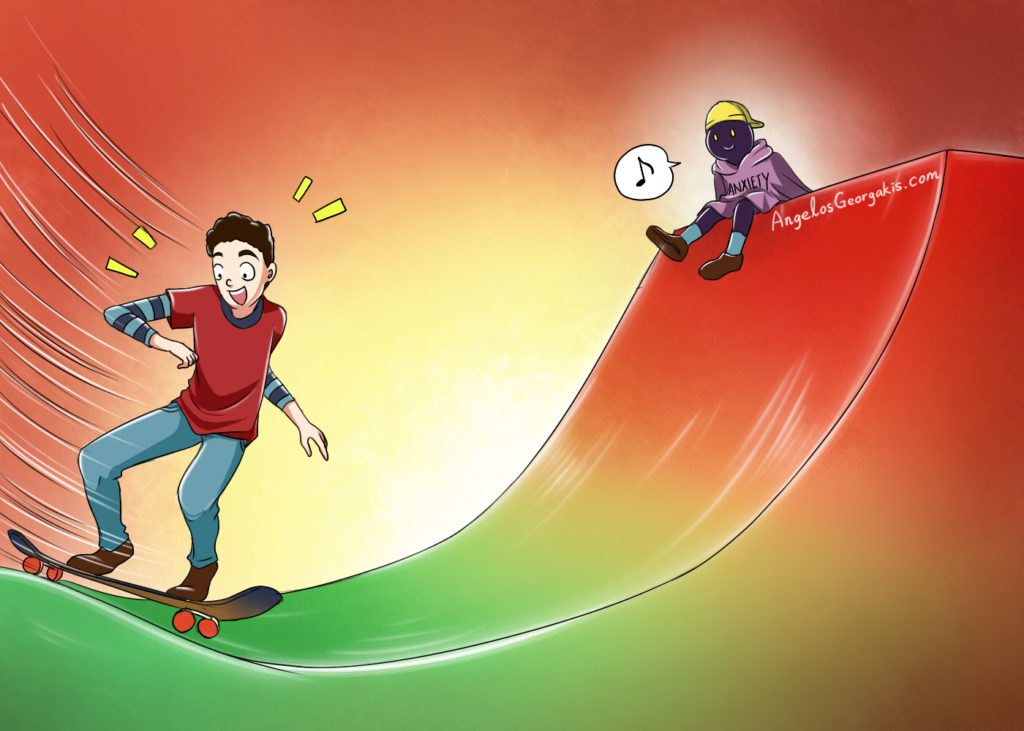
What Else Can Help me with Anxiety?
This guide focuses on observing and facing anxiety rather than presenting ways to manage it. From my experience working with people, I’ve found this to be the most effective way.
Since you’re reading this guide, you’ve probably tried to improve your diet, cut out sugar, quit smoking, do meditation, improve your sleep and all the usual anxiety management options.
Yet, in order to give you the full picture and find the full truth for myself, I searched for research-backed data on the benefits of anxiety management techniques such as meditation, diet, sleep, etc.
You may have heard that Vitamin C helps with reducing stress and anxiety. When I looked for research evidence I found that although Vitamin C reduces anxiety for students, the addition of fruits and vegetables to the diet does not significantly reduce anxiety symptoms in young adults.
Getting more sleep sounds like good advice for someone with anxiety and this is backed by this research. Good sleep eases my anxiety too. But still, as UC Berkeley researcher Andrea Goldstein says, “It’s been hard to tease out whether sleep loss is simply a byproduct of anxiety, or whether sleep disruption causes anxiety. Research has shown that psychiatric disorders and sleep disruption often occur together”.
This is what Jim Folk confirms here talking about the same research:
A common problem, however, is that anxiety disorder—which increases stress hormone production—can interfere with getting good sleep. Consequently, a negative cycle can set up where anxiety has caused sleep disruption, sleep disruption has caused an increase in anxiety, an increase in anxiety can cause more sleep disruption, an increase in disrupted sleep can cause a further increase in anxiety, and so on.
This is my concern when it comes to sleep. Imagine you’re suffering from anxiety and sleep disruption and I say to you, “You need to get more deep sleep.”.
How does that make you feel? Let me guess! More anxious right?
And then you add another layer to your anxiety—lack of sleep.
I’ve been there. It’s a vicious circle.
When it comes to meditation and mindfulness, I initially came across this Harvard Medical School article in which the author suggests that “mindful meditation can help ease psychological stresses like anxiety, depression, and pain” citing this review of different studies.
But if you see the review itself, the researches concluded: “Reviews to date report a small to moderate effect of mindfulness and mantra meditation techniques in reducing emotional symptoms (anxiety, depression, and stress) and improving physical symptoms (pain)”.
Am I trying to discourage you from meditating? Absolutely not!
I’m only saying that it’s probably unrealistic to expect anxiety to say goodbye forever if you meditate for 10 minutes every day.
It’s all about expectations. Getting heavily invested in a solution, expecting a lot and getting so little may result in further anxiety. That’s why I follow the acceptance approach: Accept your anxiety, don’t fight it, turn your focus to something else, and you will feel better.
Spending time in nature is another way to relieve your anxiety. I know it doesn’t sound novel but who doesn’t feel better spending time by the sea or among the trees? I don’t need research to back this one.
Laughter can also help with anxiety. What I found particularly interesting is this fact that I read in Nicholas Christakis’ book Connected.
If you feel anxious it might help to force yourself to smile as the signal of “I’m happy” goes from the facial muscles to the brain and not vice versa!

Expressive writing and journaling are other science-backed methods that not only help you relieve your anxiety but have all sorts of other benefits. Here’s a study at the University of Cambridge that proves that. Why don’t you use the instructions that were given to those who participated in the study:
For the next 4 days, I would like you to write your very deepest thoughts and feelings about the most traumatic experience of your entire life or an extremely important emotional issue that has affected you and your life.
In your writing, … really let go and explore your deepest emotions and thoughts. You might tie your topic to your relationships with others, including parents, lovers, friends or relatives; to your past, your present or your future; or to who you have been, who you would like to be or who you are now.
You may write about the same general issues or experiences on all days of writing or about different topics each day. All of your writing will be completely confidential. Don’t worry about spelling, grammar or sentence structure. The only rule is that once you begin writing, you continue until the time is up.
Unusual Ways that Might Help you Deal with Anxiety
While writing this guide I tried to find as much information as I could in terms of what works for anxiety. Here are some more things you can try and see if they work for you.
Anxiety leaves when it perceives you’re safe. Until then you can try methods such as the ones below.
Write down full names. Any names! Random names! Once you start jotting down names like “John Brunson, Doe, or Richard Lee Sung” and get into the groove of just making names up or listing the names of people you know, you’ll be able to calm down or release the tension you feel, especially if you apply a lot of pressure to your pen or pencil.
Keep your bed a stress-free zone! If anxiety keeps you up at night, get out of bed so you don’t come to associate those feelings with a space meant for sleep. If you can’t sleep, that’s OK. You can read a book, watch a film, or exercise.
Ground yourself by making obvious observations about the world around you:
- Here’s an orange book.
- Today is Tuesday.
- Look at that house over there.
Stare at something for 1 minute. Choose an object—the sky, a book. Look out through the window. It will slow your thoughts down, it will help you relax.
A Similar Approach to Stress
In her Ted Talk ‘How to make stress your friend’ psychologist Kelly McGonigal admitted that she had got it wrong for years when it comes to stress:
I fear that something I’ve been teaching for the last 10 years is doing more harm than good, and it has to do with stress. For years I’ve been telling people, stress makes you sick. It increases the risk of everything from the common cold to cardiovascular disease. Basically, I’ve turned stress into the enemy. But I have changed my mind about stress, and today, I want to change yours.
I no longer want to get rid of your stress. I want to make you better at stress. Next time your heart is pounding from stress, remember that this is your body helping you rise to this challenge. And when you view stress in that way, your body believes you, and your stress response becomes healthier.
So, the problem is not the stress itself, but stressing out about stressing out!
Have you watched this popular video with Rabbi Twerski in which he gives a whole new perspective about stress?
As the lobster grows, its shell becomes confining, and the lobster feels under pressure and uncomfortable. It goes under a rock formation to protect itself from predatory fish, casts off the shell, and produces a new one. The stimulus for the lobster to be able to grow is that it feels uncomfortable.
One of my own coaches and best-selling author Michael Neill, to his clients’ surprise, refuses to promote any meditation or technique or hypnosis regimen to ‘control’ stress. He says there is no problem with stress:
If you go outside and it’s snowing, you don’t have to fix the weather. You simply put on some more appropriate clothes or go back inside and wait until the storm has passed. No matter how bad the weather seems, the sun is always shining in the background.
My mentor and psychologist Dr George Pransky, says the same about stress:
There is no need for techniques, strategies or working on yourself when it comes to stress!
I definitely recommend watching his videos series The Real Source of Stress.
Coaching Clients with Anxiety
I often disrupt my clients’ realities by remaining totally apathetic and neutral to their stories around anxiety.
This at first might seem weird to them and they may think I don’t care about them but it takes them out of their heads for sure.
When they see me perceive their situation as normal they develop curiosity and start questioning their own stories.
Overcoming Anxiety Cheat Sheet
I know this is a long guide so here’s all you need to remember:
#1. Learn to accept your anxiety. Let it come and go. The more you fight it, the more it fights back.
#2. Take a break for 2 weeks. Imagine there is nothing you can do about your anxiety. How would you live your life? Live it. See what happens when you stop trying to control your anxiety.
#3. Stop trying to explain your feelings. Accept all feelings. Let feelings come and go.
#4. Give a different meaning to your anxiety. See it as excitement! Say, “I’m excited about my interview/presentation/wedding tomorrow”.
#5. Give a name to your anxious self. Call it Carla, or Peter! This will help you get out of your problem. You will see anxiety from a perspective. It’s not you who’s anxious—it’s Carla!
#6. If you’re stuck in negativity, try to remember a time when you felt a positive feeling. Visualise it. What were you doing back then? This exercise will make it easier for that positive feeling to come back.
#7. Doubt all you’ve come to believe about the cause or consequences of your anxiety. Ask yourself: Is this absolutely true? If not, what else might be true that’s more empowering and serves me better?
#8. Use the D.A.R.E response. Defuse the anxious state by saying ‘so what?’, Allow all feelings to flow, Run towards the danger by saying I’m excited, and Engage in some activity until the anxious feeling goes away.
#9. Do nothing. What would you do if you were not feeling anxious right now? Well, do that! The more you do to push the anxiety away, the more you send a signal to your unconscious that anxiety is still here!
#10. Visit the hospital as many times as you wish. Do all the necessary exams. The more you do, the better. This will prove to you that your health is not in danger. It’s just anxiety! Thank God!
#11. You can do your yoga, meditation, or anything else that helps you feel peaceful, but that doesn’t mean that you will never get anxious again.
#12. The true freedom comes when you learn to accept your anxiety rather than trying to get rid of it. We are transformed by what we accept.
Final Thoughts
I hope this guide threw some light on your anxiety and helps you change your feelings towards it. If it didn’t, I hear you. This understanding doesn’t come easily.
If you’re still sceptical, I want to tell you that the person that wrote this guide is not a guru.
I still experience and will experience anxiety from time to time in his life. I’m OK with that.
If you come across someone on the road who claims they’ve eliminated anxiety from their lives and can teach you to do so, be sceptical with them, too.
I may be wrong. Some monks or enlightened people out there have eliminated anxiety from their lives. Until I become one of them, I decided to make peace with my anxiety and my anxiety made peace with me.
With love, Angelos
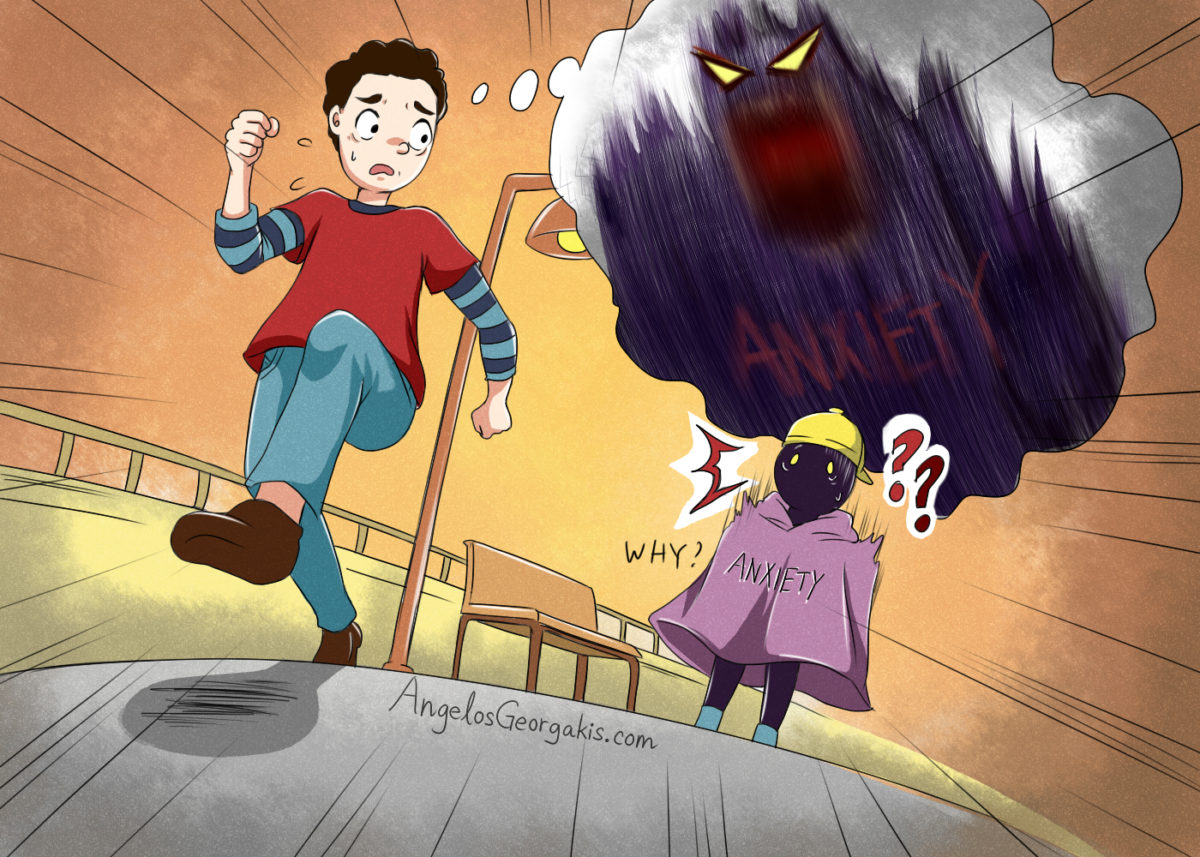
5 replies on “Overcoming Anxiety – A Complete Guide”
Angelos! Who knew? This has to be my biggest surprise this morning. Personally I never feel anxious about anything. I’m thankful for my life and deal with things as they arise. I like your cartoons! Keep up the good work!
I believe in much of what is written in this article. I offer two suggestions:
1. To those interested in furthering their understanding of the concepts offered in the article I suggest a more extended education in “insight meditation”. Much of what is contained in this article is actually addressed quite extensively as part of meditation; rather than apposed to by meditation as stated here. Most specifically, the concept of acceptance, which I personally believe the most critical component; the establishment of a foundation on which to build.
2. While I agree much of the basic guidance provided in this article may be beneficial in addressing anxiety, I suggest the scope of the effects felt are more broad and encompass all aspects of one’s life; anxiety being only one. The overarching effects and implications is vast.
In summary; I encourage readers to expand their knowledge of insight meditation and embrace a more broad area of influence not limited to anxiety. Lastly, in contrast to one point taken in the article; I believe the more thorough understanding of emotions, from the objective neurological mechanics to the subjective real world observations of our emotions is also critical to understanding not only WHAT we are choosing to accept, but also WHY.
Nice article. Thank you.
Thank you, Jim. I appreciate your suggestions!
Hi Angelos,
This is a fantastic guide on anxiety. You are definitely on to something…wish you success in this journey.
Thank you Shiv. I’m glad you liked it. Angelos